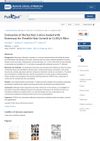 1 citations,
March 2023 in “PubMed”
1 citations,
March 2023 in “PubMed” Rosemary hair lotion significantly promotes hair growth and could be a potential alternative to commercial hair growth products.
 June 2024 in “MEDFARM Jurnal Farmasi dan Kesehatan”
June 2024 in “MEDFARM Jurnal Farmasi dan Kesehatan” Rosemary oil nanoliposome gel is effective for promoting hair growth.
 3 citations,
July 2021 in “International journal of pharmaceutical chemistry and analysis”
3 citations,
July 2021 in “International journal of pharmaceutical chemistry and analysis” Medicinal plants like Aloe, Amla, and Coconut oil help with hair and skin care.

Some TikTok hair loss remedies like rosemary oil, onion juice, and garlic gel show promise, but more research is needed and they might delay proper treatment.
Rosemary oil effectively promotes hair growth in mice.
 1 citations,
May 2022 in “Scientific African”
1 citations,
May 2022 in “Scientific African” Oleogels made from Cedarwood and Rosemary oils can enhance hair growth, but combining both oils doesn't increase the effect.
 40 citations,
August 2018 in “Skin appendage disorders”
40 citations,
August 2018 in “Skin appendage disorders” Some alternative treatments for hair loss might work, but more research is needed.
 14 citations,
October 2020 in “Natural Products and Bioprospecting”
14 citations,
October 2020 in “Natural Products and Bioprospecting” Various treatments, including FDA-approved drugs, natural products, and oral supplements, can help with hair loss, but a patient's medical history and potential allergies should be considered when choosing a treatment.
 February 2024 in “International journal of biology, pharmacy and allied sciences”
February 2024 in “International journal of biology, pharmacy and allied sciences” Plant-based treatments can effectively and safely treat hair loss.
 1 citations,
March 2023 in “Applied sciences”
1 citations,
March 2023 in “Applied sciences” Lavender, lemongrass, rosemary, and chamomile essential oils may help protect cells important for hair growth from damage and could promote hair growth.
 January 2020 in “Journal of dermatology research and therapy”
January 2020 in “Journal of dermatology research and therapy” Most over-the-counter hair loss treatments lack strong evidence of effectiveness but cost nearly as much as the proven treatment, minoxidil.
April 2023 in “International Journal of Dermatology” More research is needed to confirm if popular hair oils effectively treat hair loss.
February 2014 in “아시안뷰티화장품학술지” Natural extracts like peppermint and rosemary oils are effective for hair growth and scalp health.
 November 2024 in “Skin Appendage Disorders”
November 2024 in “Skin Appendage Disorders” Misinformation about alopecia can lead to poor treatment, so it's important for healthcare professionals to correct myths.
April 2023 in “Seven Editora eBooks” Essential oils may help hair growth, but more research is needed.
 January 2024 in “International Journal of Research Publication and Reviews”
January 2024 in “International Journal of Research Publication and Reviews” The herbal hair serum with rosemary, hibiscus, and neem is safe and effective for hair care.
 36 citations,
January 2014 in “Evidence-based Complementary and Alternative Medicine”
36 citations,
January 2014 in “Evidence-based Complementary and Alternative Medicine” Pumpkin seed oil helps hair growth in men with hair loss.
 2 citations,
August 2020 in “Natural Product Communications”
2 citations,
August 2020 in “Natural Product Communications” A mix of Platycladus orientalis leaf extract and alpha-terpineol helps mice grow hair by increasing growth factors and cell growth.
 3 citations,
June 2004 in “Alternative and Complementary Therapies”
3 citations,
June 2004 in “Alternative and Complementary Therapies” The document concludes that hair loss is influenced by genetics and other factors, and while treatments like finasteride can help, they have limitations and side effects.
 March 2024 in “International journal of pharmaceutical sciences and drug research”
March 2024 in “International journal of pharmaceutical sciences and drug research” Androgenetic alopecia is influenced by various factors and can be treated with medications, procedures, and non-drug methods.
 16 citations,
September 2018 in “Journal of Ethnopharmacology”
16 citations,
September 2018 in “Journal of Ethnopharmacology” Plant-based remedies may treat hair loss by reducing inflammation and improving insulin resistance.
 54 citations,
May 2018 in “Journal of The European Academy of Dermatology and Venereology”
54 citations,
May 2018 in “Journal of The European Academy of Dermatology and Venereology” Low level laser therapy works best for hair loss, followed by PRP, finasteride, and minoxidil.

The serum effectively promotes hair growth and reduces gray hair without side effects.
10 citations,
November 2013 in “African Journal of Traditional Complementary and Alternative Medicines” Herbal oils from Cuscuta reflexa help with hair growth, dandruff, and hair fall.
 10 citations,
May 2018 in “Nutrition and Cancer”
10 citations,
May 2018 in “Nutrition and Cancer” Certain spices may help prevent and treat skin cancer, but more human trials are needed.
 December 2024 in “International Journal of Advanced Research in Science Communication and Technology”
December 2024 in “International Journal of Advanced Research in Science Communication and Technology” The herbal hair tonic is safe, effective for hair growth, and treats scalp issues.
 December 2023 in “Medicine and Materials”
December 2023 in “Medicine and Materials” Essential oils are increasingly used in cosmetics for their natural benefits but must be used carefully to avoid skin reactions.
October 2022 in “Our Dermatology Online” The Trust tonic is more effective than minoxidil for treating hair loss.
 10 citations,
June 2019 in “International Journal of Cosmetic Science”
10 citations,
June 2019 in “International Journal of Cosmetic Science” Some plant-based chemicals may help with hair growth, but more research is needed to confirm their effectiveness.
 January 2024 in “Deleted Journal”
January 2024 in “Deleted Journal” Essential oils like lavender, chamomile, and bergamot help manage stress and improve well-being.
























